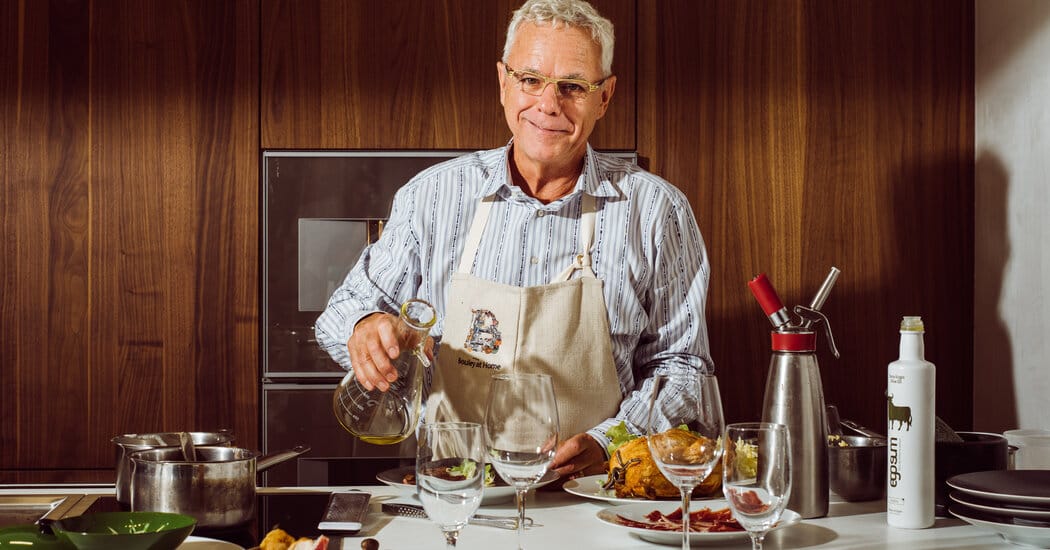David Bouley, the American chef who first translated French nouvelle cuisine into the New American style that shaped modern high-end cooking, died on Monday at his home in Kent, Conn. He was 70.
The death, from a heart attack, was confirmed by his wife, Nicole Bartelme.
Mr. Bouley’s simple but sleek cuisine made a grand entrance in 1985 at Montrachet, the restaurant that put TriBeCa on the map as a culinary destination. It was one of the first modern French restaurants to receive three stars from The New York Times.
At his restaurant Bouley, which operated in several locations between 1987 and 2017, he introduced New Yorkers to new ideas like Japanese-style tasting menus, vegetable-based sauces and the value of locally farmed ingredients. “We never used caviar and truffles,” said Bill Yosses, the former White House pastry chef, who worked with Mr. Bouley at Montrachet and Bouley for almost 20 years. “David was much more interested in Tristar strawberries.”
Mr. Bouley persuaded diners to put themselves in his hands, with no printed menu or specific number of courses. He wielded sorbets, juices and vinegars to brightening the profile of restaurant food, which he considered overly dependent on butter, cream and stock.
“He got modern three-star Michelin dining to make sense to Americans,” said Dan Barber, the chef at Blue Hill at Stone Barns, who worked under Mr. Bouley for two years. “He had an otherworldly ability to create and capture flavor, and he did it without menus or recipes, night after night.”
Bouley’s entrance was perpetually stacked with ripening apples, reminding guests that they were far from the cut flowers and crystal vases of Midtown’s classic temples to French cuisine: Le Cirque, Le Périgord and La Côte Basque. Earlier in his career, Mr. Bouley had worked in all three. He also trained influential chefs like Christina Tosi, Anita Lo and James Kent.
Mr. Bouley’s restaurant empire did not extend beyond the borders of TriBeCa, but expanded with his reach into the worlds of Japanese technique, European tradition, and — in his last decade — medicine and agriculture.
In 2013, he began a series of dinners called “The Chef and the Doctor,” working with dozens of medical professionals who shared his conviction that food could be optimized for nutrition as well as flavor. Since 2017, at Bouley Test Kitchen and Bouley Botanical, he has run test kitchens, lectures, classes and a “tasting library,” but has not had a restaurant in New York.
His cookbook “East of Paris; The New Cuisines of Austria and the Danube” reflected the cuisine of his restaurant Danube, which won two Michelin stars in 2006.
Mr. Bouley is the only American-born chef to receive a review from every restaurant critic for The Times since 1985, including a four-star review for Bouley in 1990 and a three-star review in 2016 from Pete Wells, who wrote of Bouley: “Mr. Bouley takes paths nobody else is on, and walks farther along them than anybody else would.”
Mr. Bouley’s path was shaped by his mother’s French heritage. At a time when French chefs ruled global fine dining, Mr. Bouley’s command of the language led him into the kitchens of chefs like Paul Bocuse, Joël Robuchon, Roger Vergé, Gaston Lenôtre and Frédy Girardet.
Like those chefs, Mr. Bouley was fascinated by the seasonality, beauty and precision of Japanese cuisine. In 2011, in collaboration with the Tsuji Culinary Institute in Osaka, Japan, he opened Brushstroke, an innovative restaurant that later housed the omakase counter Ichimura.
In 2015, he was the first American person to be honored as a culinary ambassador of Japan; in 2022, he was named a chevalier by the French culture ministry for his “creative and visionary contributions to the French culinary arts.”
David Gregory Bouley was born May 27, 1953 in Storrs, Conn. His mother, M. Theresa Salembier Bouley, was a professor of education and his father, Henry Bouley Sr., was self-employed. His maternal grandparents immigrated to Rhode Island from France in 1929; as a child, Mr. Bouley often said, he gathered eggs, milked cows and made butter on their 43-acre farm in Woonsocket, sparking his lifelong dedication to fresh ingredients.
He attended the University of Connecticut at Storrs, and completed the Cours de la Civilisation Française at the Sorbonne in Paris before seeking work at the renowned Moulin de Mougins restaurant, near Cannes, in 1977.
He and Ms. Bartelme, an artist and founder of the TriBeCa Film Festival, were married in August 2006 in the Loire Valley of France.
He is survived by his wife, five siblings; Martin Bouley, Jon Bouley, Marc Bouley, Michelle Bouley and Theresa Bouley, and 14 nephews and nieces.
After the 9/11 attacks, Mr. Bouley turned Bouley Bakery, a few blocks from ground zero, into a base from which he fed firefighters and police officers. With a $5.8 million contract from the Red Cross, Mr. Bouley, with an army of employees and volunteers, also fed rescue workers and construction teams, cooking 20,000 to 30,000 meals every 24 hours, rejecting shelf-stable ingredients in favor of whole salmon, lobsters and produce donated from around the country.
“I cook as if I were in love with everyone I’m cooking for,” he had told The Times in a 1992 profile. “I work best with my back against the wall. It’s when some of the best things surface.”
Follow New York Times Cooking on Instagram, Facebook, YouTube, TikTok and Pinterest. Get regular updates from New York Times Cooking, with recipe suggestions, cooking tips and shopping advice.

